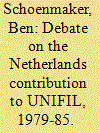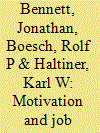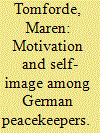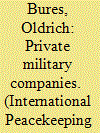| Srl | Item |
| 1 |
ID:
069903


|
|
|
|
|
| Publication |
2005.
|
| Summary/Abstract |
This article examines the motives of the Dutch government for participating in UNIFIL in 1979 and for withdrawal after six years. The Dutch government was swayed mainly by considerations of national prestige. It decided to participate in UNIFIL as a way to improve the standing of the Netherlands in the world. From the outset, the Dutch government had little faith in the feasibility of the mandate and the usefulness of the operation. It would also have preferred to leave southern Lebanon as soon as possible, but the fear of losing international credibility and putting a spanner in the works of US diplomacy deterred it from taking that step.
|
|
|
|
|
|
|
|
|
|
|
|
|
|
|
|
| 2 |
ID:
069894


|
|
|
|
|
| Publication |
2005.
|
| Summary/Abstract |
This article contends that methodologically the discourse of Humanitarian Intervention (hereafter HI) has not been able to move beyond its own conventions. These conventions focus on the decision-making process, concerning whether or not to intervene. This creates a situation in which the underlying reasons for so-called 'supreme humanitarian emergencies' are not addressed. Consequently, opportunities for preventing humanitarian emergencies are missed. Only when the wider context in which supreme humanitarian emergencies occur, here identified as the liberal international order, becomes an integral part of theorizing about HI can international society attempt to implement the principles of humanity.
|
|
|
|
|
|
|
|
|
|
|
|
|
|
|
|
| 3 |
ID:
069900


|
|
|
|
|
| Publication |
2005.
|
| Summary/Abstract |
Motivation and its determinants were the focus of this three-point survey among the 5th Swiss Support Company in Suva Reka, Kosovo. Belief in the meaningfulness of the tasks and in the benefits of their activities proved to be the main predictive factors both for volunteering and for reporting higher levels of personal satisfaction. Great importance can also be attributed to the moral support provided by the personal environment at home (parents, friends, acquaintances). Other motivating aspects (quality of training and equipment, infrastructure) only gradually unfold their influence on motivation and job satisfaction. In general, motivation was found to be high at the beginning of the mission, but clearly lower halfway through. Towards the end of the mission, motivation increased again but did not reach the initial level. Special attention should be paid to horizontal and vertical cohesion in the contingent, the quality of catering and the conditions of collaboration with other national contingents.
|
|
|
|
|
|
|
|
|
|
|
|
|
|
|
|
| 4 |
ID:
069901


|
|
|
|
|
| Publication |
2005.
|
| Summary/Abstract |
Based on anthropological fieldwork and questionnaire surveys, this article examines the experience of German peacekeeping units (7th and 8th contingents) deployed to Bosnia and Herzegovina (BiH) as part of the Stabilization Force (SFOR) in 2003-04. The main research topic was the motivation of German soldiers of all ranks before embarking on and during peacekeeping missions. The results of this quantitative and qualitative study emphasize that differences exist between motivation for deployment and motivation during deployment. These differences are explained and linked with results from the assessment of Bundeswehr soldiers' self-images during deployment.
|
|
|
|
|
|
|
|
|
|
|
|
|
|
|
|
| 5 |
ID:
069896


|
|
|
|
|
| Publication |
2005.
|
| Summary/Abstract |
Increasingly, significant numbers of personnel are deployed in field missions either to serve as police officers or to assist in reforming national police capacity. Reforming and building a police system - in this article termed 'policebuilding' - is exceedingly difficult, demanding the condensing of diverse training skills in a very short period and fast-forwarding the development of skills that are ideally built up over generations. This article examines the Australian initiative of 2004 that broke with the makeshift pattern of international police reform by forming an International Police Deployment Group (IDG). It assesses the deployment to the Solomon Islands in order to draw out lessons for future instances in which IDG officers may be called upon. The IDG appears to offer an apt structure, depth of planning, continuity of staffing and steadiness of resourcing that past missions have lacked. Yet, while relative calm and basic levels of law and order have been restored to the Solomon Islands, transferring authority and successfully supporting local police reform has proven to be more difficult.
|
|
|
|
|
|
|
|
|
|
|
|
|
|
|
|
| 6 |
ID:
069897


|
|
|
|
|
| Publication |
2005.
|
| Summary/Abstract |
This article analyses the perils and benefits of outsourcing UN peacekeeping to private military companies (PMCs). Various PMCs have a proven capacity to perform at least some peacekeeping functions. Although experts have expressed serious doubts whether their capacity to do peacekeeping will always translate into the achievement of peace and security, the author contends that PMC peacekeeping should not be dismissed on ideological or moral grounds when the choice is either a PMC operation or none at all. It is, however, imperative that the perils of using PMCs are addressed before peacekeeping is turned over to the private market. In particular, a set of clear mechanisms of accountability, control and transparency of the PMCs needs to be put in place.
|
|
|
|
|
|
|
|
|
|
|
|
|
|
|
|
| 7 |
ID:
069898


|
|
|
|
|
| Publication |
2005.
|
| Summary/Abstract |
This study reviews the international property-related interventions in post-conflict Bosnia and Kosovo, and explains the justifications for establishing international mass claims proceedings to restore or compensate for lost property rights as a consequence of conflict and discrimination. The institutions and processes are a milestone in the protection of the rights of refugees and internally displaced persons in post-conflict peacebuilding. These case studies demonstrate that property restitution has not been fully successful in its primary objective of re-establishing multiethnic societies by safeguarding housing and property rights. It has nevertheless fostered the rule of law and contributed to ethnic reconciliation by providing post-conflict justice and acknowledging past wrongs.
|
|
|
|
|
|
|
|
|
|
|
|
|
|
|
|
| 8 |
ID:
069895


|
|
|
|
|
| Publication |
2005.
|
| Summary/Abstract |
This article examines the use of force with respect to the protection of civilians in peace operations, using MONUC as a case study. By analysing the provisions on the use of force and the importance attached to the human rights situation in the authorizing resolutions of the Security Council, it suggests that the UN is inclined to broaden the concept of use of force when facing a deteriorating human rights situation. The discrepancy between the written ambitions and the political willingness to ensure their practical implementation, however, remains huge. In this vein, it is crucial that the Security Council not only considers but also adopts the recommendations by the Secretary-General and the UN High Commissioner for Human Rights. If so, the important synergy and complementarity between the roles of peacekeepers and human rights officers is more likely to bear fruit in the field
|
|
|
|
|
|
|
|
|
|
|
|
|
|
|
|